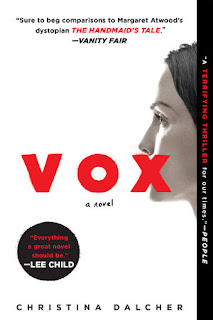Review: Go out and VOTE!
Dalcher’s
novel Vox is an extremely eerie exploration of the silencing of women
and their rights. In this dystopian society, women are property of men and have
a daily word allowance of 100. Pass this allowance, and you get increasingly
painful shocks to your body from your wrist counter. The novel follows Jean, a
married woman with four children, one a girl. I really enjoyed seeing the way
that Dalcher writes male and female characters in this world. They would obviously
interact differently in a world where women’s rights are nonexistent, and I
think Dalcher shows that super effectively. Even though the narration is third,
it is close on Jean. I enjoyed being able to see how a woman would think with
these types of obstacles thrown in her way.
The ambiguity in Jean’s thoughts
about the dystopian world is also so well done. She has doubts and thinks about
her old college roommate often. Jackie was an activist, a feminist, and always
voicing her opinions at rallies and debates when they were in college. Jean
dismissed her at the time and found her attitude about politics overbearing.
Jean contemplates how she acted in the past towards Jackie and how Jackie
actually turned out to be completely right instead of crazy, like Jean thought.
Dalcher’s ability to use this detail to show us the timeline of her dystopian
creation is amazing. I know plenty of men and women who believe that women who
march and protest and are up in arms about policies and politics are overdoing
it. We aren’t overdoing it. We are protecting our rights from encroachment,
just as Jean eventually learns Jackie is doing. I loved that Jean isn’t a
perfect character. She knows that she is far from perfect and acknowledges that
to herself. That is the making of a dynamic, believable character. She wasn’t
always doing the right thing and still doesn’t throughout the novel, but she
tries.
One large concept I really admired
in this novel that I already briefly touched on was how Dalcher placed the
reader in a very familiar time period (Trump’s presidency) without ever
mentioning that this was the period she wanted us to know we were in. It was
subtle yet obvious at the exact same time. Early on in the novel, Dalcher
describes the first lady. Jean discussed how she remembers when the first lady “decorated
the pages of Vogue and Elle, almost always modeling low-cut and
high-cropped swimwear or lingerie” (36) and how she seems to have undergone a metamorphosis.
Married to the president, she now is “never smiling, never wearing anything
that falls less than three inches below her knees” (37). The description of her
clothing continues on for an entire paragraph. Jean also describes the first
lady as being “at his side only during public events” (37). Jean also says that
her eyes “have the vacant, lusterless quality of a woman who now sees the world
in shades of gray” (37). How can you read this description and not think of Melania
Trump when this book was published in 2018?
Dalcher also sprinkles in
references to an extremely similar Barack Obama-like president being the
president before the current one in the novel. We learn that not too long ago, “America’s
first black president had taken the keys” and a side character is “all talk of
politics and hope” (255). Jackie says something in passing to Jean who notes
that it was something of the usual catchphrases, including “hope-change-yes-we-can!”
(152). Dalcher peppers in small references to Obama and his campaign
catchphrases.
We don’t see much of the actual
president in the novel, but we do learn what his campaign slogan was: “Make
America Moral Again” (135). It sounds all too familiar. We are also reminded, even
on the last page of the novel, that these removals of women’s rights happened
all within a twelve-month span. This is something that is entirely possible for
our society as it stands. Dalcher creates a fictional narrative that isn’t far
off from 2019 if we don’t get our shit together. In the novel, “after the
election, we started believing. Some of us became vocal for the first time”
(184). We are here right now and Dalcher is calling for social action. This
novel was brilliantly written, but the ending was the only thing that I had
issue with. Many things happen in the last twenty-five pages, things that are
way too emotional to gloss over the way they were. The ending could have used
some slowing down, but overall this was an amazing read that made me so angry
throughout for good reason. Dalcher wants action and this novel definitely prompted
it.

Comments
Post a Comment